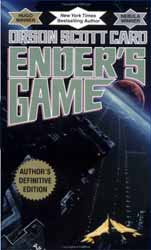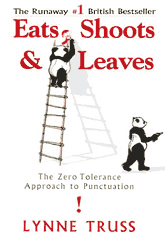
Winner of the Hugo and Nebula Awards, Ender’s Game by Orson Scott Card revolves around a young boy, Ender Wiggin, who is selected to train to become a fleet commander to protect earth from an alien invasion. The training takes place at a distant Battle School in space where the young and brilliant Ender is repeatedly pushed to his limits to mold him into what he is needed to be, to become the next commander and win the war against the invaders.
I’ve read Ender’s Game 5 or 6 times in the last 15 years, and recently listened to the audiobook. I honestly think that Ender’s Game is the best piece of science fiction I have ever read. Card is unusual as a science fiction writer in that he delves deeply into the psychology of his main characters and their complex inter-relationships. Nothing is as black and white as it may seem. There is goodness and honor in Ender’s enemies as well as a willingness to manipulate and kill in Ender. Ender is constantly faced with hard choices upon which his survival and the fate of the planet depend.
Continue reading →

Note to self: use more semi-colons.
Lynn Truss has written a delightful best-seller on the art of using commas, apostrophes, and semi-colons in her Eats, Shoots & Leaves: The Zero Tolerance Approach to Punctuation. After reading this book all I can think of is that I need to use semi-colons more often. Eats, Shoots & Leaves is both a useful guide to punctuation (primarily from a British perspective) and a witty and humorous rant against the declining use of proper punctuation in our culture. Ms. Truss frequently delves into the historical roots of many of the punctuation and type formatting standards we take for granted today.
How could a book on punctuation make it to the best seller list and stay there for… how many months has it been? One reason is by being well written and entertaining. Another reason is that those of us who read books also often like to write. Since the dawn of email and the Internet we’ve been writing much more than we would ever have expected to. As such, many of us are on the one hand appalled by the lack of proper punctuation populating the emails of those born around the same time as the personal computer, and on the other hand trying to remember what exactly those rules were that we learned so long ago. Eats, Shoots & Leaves appeals to us for both reasons; Truss lambasts the awful punctuation she sees daily while gently explaining the guidelines for doing it right. (I did it! I used a semi-colon in a sentence!)
Continue reading →
There are only 4 questions of value in life, Don Octavio:
What is sacred?
Of What is the spirit made?
What is worth Living for? and
What is worth Dying for?
The answer to each is the same: only Love!
Don Juan DeMarco to Don Octavio
in the film Don Juan DeMarco
To dare is to lose one’s footing momentarily. To not dare is to lose oneself.
Soren Kierkegaard
Chess, which exists predominantly in two dimensions, is one of the world’s most difficult games. Three-dimensional chess is an invitation to insanity. But human relationships, even of the simplest order, are like a kind of four-dimensional chess, a game whose pieces and positions change subtly and inexorably between moves, whose players stare dumbly while their powerful positions deteriorate into hopeless predicaments and while improbable combinations suddenly become inevitable. To make matters worse, some games are open to any number of players, and all sides are expected to win.
Robert Grudin
From Time and the Art of Living
A poet should learn with his eyes
The forms of leaves –
He should know about oceans and mountains
In themselves,
And the sun and the moon and the stars.
His mind should enter into the seasons,
He should go
Among many people
In many places
And learn their languages.
Kshemendra (c.1150)
from Kavikanthabharana from the Sanskrit

